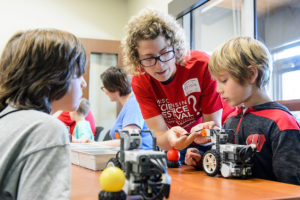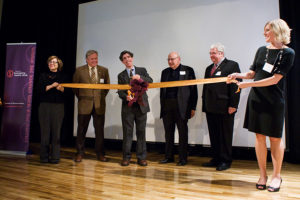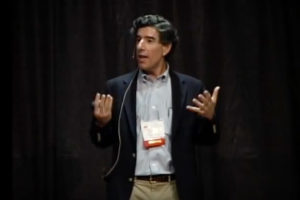The Center for Healthy Minds at the University of Wisconsin–Madison’s Waisman Center will welcome His Holiness the 14th Dalai Lama to its public grand-opening celebration Saturday-Sunday, May 15-16.
UW–Madison neuroscientist Richard Davidson established the Center for Healthy Minds (first named the Center for Investigating Healthy Minds) to scientifically determine how healthy qualities of mind develop and to investigate interventions to cultivate those qualities in children and adults.
Davidson has worked with expert meditation practitioners to determine how meditation changed their brains to encourage happiness, compassion and kindness. The Center will extend this research to a broader audience and will be the first translational research facility to include a brain imaging lab and meditation space under one roof.
“When I met the Dalai Lama in 1992, he challenged me to adapt the tools of Western science, used to study fear and depression, to the study of positive qualities, like kindness and compassion. The Center is a response to that challenge and will become what we hope will be the world’s premier center for research of this kind,” says Davidson, a UW–Madison professor of psychology and psychiatry and director of the Waisman Laboratory for Brain Imaging and Behavior.
The Dalai Lama previously visited Davidson’s lab at the Waisman Center in 2001 and continues his involvement with Davidson and other scientists to further explore the convergence of neuroscience and contemplative traditions.
The Dalai Lama will join Davidson in a public dialogue at 2:15 p.m. on Sunday, May 16, at Madison’s Overture Center for the Arts. Daniel Goleman, best-selling author of Emotional Intelligence and Ecological Intelligence will moderate the conversation, “Investigating Healthy Minds.” Gov. Jim Doyle will deliver opening remarks, followed by a special musical performance by Madison Youth Choirs.
Tickets for this event are free and will be available to the public in mid-April. The conversation also will be available via live Web cast.
The grand-opening weekend also includes a presentation by Jon Kabat-Zinn, founder of the Center for Mindfulness in Medicine, Health Care and Society at the University of Massachusetts Medical School. His talk, “Mindfulness, Meditation and Health: Transformation and Healing at the Confluence of Science and Dharma,” will be available on the Center's website shortly following the event.
The Dalai Lama also will participate in a private scientific meeting, co-sponsored by the Center and the Mind & Life Institute.
"When I met the Dalai Lama in 1992, he challenged me to adapt the tools of Western science, used to study fear and depression, to the study of positive qualities, like kindness and compassion. The Center is a response to that challenge."
The Center for Healthy Minds includes a diverse mix of scientists from several different disciplines as well as scholars in the humanities. Their mutual focus on the study of healthy qualities of mind is aided by the major instrumentation housed in the Waisman Laboratory for Brain Imaging and Behavior.
“The Center uses the plural ‘healthy minds’ to convey that there are many ways in which to have a healthy mind, and it is dedicated to studying this diversity,” Davidson explains. “The word ‘investigating’ is used since we do not yet know exactly what constitutes healthy qualities of mind. Part of the center’s mission is to conduct research explicitly examining this question.”
The Center plans to use its research to bring practices that encourage healthy qualities of mind to schools, prisons, medical settings and the world at large. It is currently working with three community populations: children and educators in the Madison Metropolitan School District, the Wisconsin Department of Corrections and returning Wisconsin veterans.
“This Center combines the basic behavioral and neuroscientific research that is necessary to move our field forward with the translational component, which is critical to extend our work beyond the walls of our laboratory,” Davidson says. “By developing and offering interventions for schools, hospitals, prisons and communities, we hope to create real change for society.”






